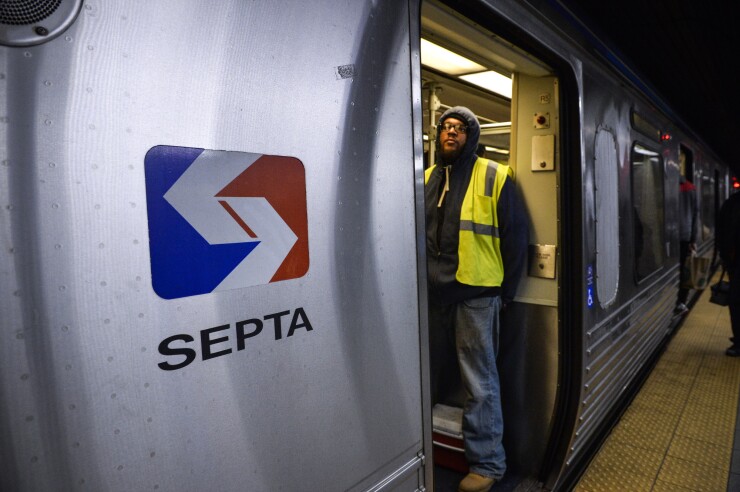Pennsylvania’s two largest mass-transit enterprises face crises regardless of how a lawsuit over toll-related revenue plays out, according to Moody’s Investors Service.
New revenue is crucial for maintaining transit funding and for the commonwealth’s progress toward structural balance, Moody’s said in a commentary on the short- and long-term challenges of the Southeastern Pennsylvania Transportation Authority and the Port Authority of Allegheny County.

They serve the Philadelphia and Pittsburgh regions, respectively. State funding covers more than half their operating and capital budgets.
The short-term threat involves transfers from the Pennsylvania Turnpike Commission, which in March 2018 suspended transfers to the two agencies pending litigation over the legality of toll increases.
“If the PTC does not resume transfers by June 30 as planned, the transit authorities will face a funding shortfall,” Moody’s said.
Judge Yvette Kane of the U.S. District Court for the Middle District of Pennsylvania in Harrisburg on April 4 dismissed a complaint by the Owner Operator Independent Drivers Association Inc., and several co-plaintiffs, who alleged that excessive tolls placed an undue burden on interstate commerce.
The truckers have said they will appeal to the Third Circuit Court of Appeals.
The commission, which is considering is weighing a return to bonding for mass-transit projects, is one of the longest-standing muni issuers in Pennsylvania, predating the Turnpike’s opening in 1940. Its system links New Jersey with Ohio.
Long-term, problems remain even if PTC transfers resume, Moody’s said, as state statute sharply reduces these transfers after 2022. That would place 30% of all transit funding at risk. Pennsylvania plans to replace the reduced transfers with existing sales taxes, but this, Moody’s said, would create a gap elsewhere in the state's general fund budget.
Pennsylvania has routinely shown little willingness to grasp its own budget challenges, according to Moody’s.
“What Moody’s is saying is that the state has room to raise taxes or some other revenue stream,” said Alan Schankel, a managing director at Janney Capital Markets in Philadelphia. “Pennsylvania’s tax rates are not the highest.”
According to Schankel, urgency could set in as the 2022 deadline nears.
“At the last minute, you might see some alternative funding solution,” he said. “They could increase the transfer back to $450 million or look for fuel taxes or some other kind of revenue.”
Messages seeking comment were left with SEPTA and the Port Authority.
“Once again, the solutions will rob the general fund of its revenues to pay for a system that was broken many years ago,” said Villanova School of Business professor David Fiorenza.

The commonwealth on Wednesday intends to sell competitively $900.49 million of unlimited tax general obligation bonds, first refunding series of 2019.
More than half of Pennsylvania Turnpike's annual revenue of $1.2 billion goes to
That law wrongly assumed that the Federal Highway Administration would approve tolling on east-west Interstate 80, which runs parallel to the turnpike system.
Moody’s rates SEPTA and the Port Authority of Allegheny County A1 with stable outlooks. It rates the Pennsylvania Turnpike Commission’s senior lien toll revenue bonds A1 and stable, and the commonwealth’s general obligation bonds Aa3 and stable.
“I am still surprised by the high ratings given by Moody's,” said Fiorenza, a former chief financial officer of Radnor County, Pennsylvania.
Moody’s also called a recurring and sustainable source of revenue pivotal to maintaining transit enterprise funding, while a new funding source would offset state-level stress. Also, said Moody’s, the state could extend the large PTC transfers beyond 2022, but continued use of the toll road is likely not sustainable.
State Auditor General Eugene DePasquale, in his latest audit, said the debt level threatens the Turnpike's existence. The commission, he said, could default on its bonds if it does not reduce its annual $450 million payment to PennDOT.
According to Fiorenza, Pennsylvania should look to privatize certain portions of the toll-road system as a pilot program.
“The commonwealth continues to fix problems with short term solutions that create long-term problems,” he said. “Part of the issues continue to be the union contracts, which do not allow for all positions to be subcontracted to outside for-profit agencies, smaller-than-usual health contributions from employees and unfunded pension liabilities.
“Seems like we have heard and seen this problem before.”





